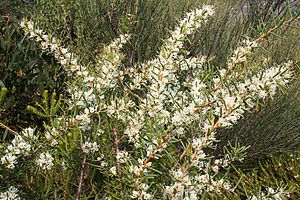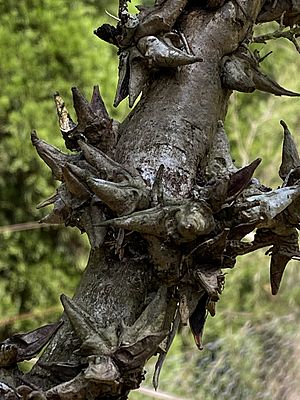Dagger hakea facts for kids
Quick facts for kids Dagger hakea |
|
|---|---|
 |
|
| Hakea teretifolia in Botany Bay National Park near Kurnell | |
| Scientific classification |
|
| Kingdom: | Plantae |
| Clade: | Tracheophytes |
| Clade: | Angiosperms |
| Clade: | Eudicots |
| Order: | Proteales |
| Family: | Proteaceae |
| Genus: | Hakea |
| Species: |
H. teretifolia
|
| Binomial name | |
| Hakea teretifolia (Salisb.) Britten
|
|
| Script error: The function "autoWithCaption" does not exist. | |
| Synonyms | |
|
|
Script error: No such module "Check for conflicting parameters".
The Hakea teretifolia, often called the dagger hakea, is a type of woody shrub. It belongs to the Proteaceae plant family. You can find it commonly growing in heathlands along the eastern coast of Australia. Its range stretches from northern New South Wales down to Victoria and Tasmania. This shrub is very prickly, so it's not often grown in gardens, but it is quite easy to care for.
Contents
What Does Dagger Hakea Look Like?
The Dagger Hakea is a very spiky shrub. It can grow up to 3 meters (about 10 feet) tall. Its leaves are thick, tough, and arranged in a spiral. Each leaf has a sharp, spike-like tip.
Flowers and Fruit
This plant usually flowers in summer, but you might see some flowers in winter too. The small white flowers grow in groups of 4 to 8 on the branches. After the flowers, the plant grows seed pods. These pods are sharp and pointed, looking a bit like small daggers. This is how the plant got its common name, "dagger hakea."
How Dagger Hakea Got Its Name
The Dagger Hakea has an interesting history behind its name.
Early Discoveries
In 1796, a person named Richard Salisbury first described this plant. He wrote about it in his book and called it Banksia teretifolia. The second part of its name, teretifolia, comes from a Latin word meaning "with round leaves."
A year later, in 1797, two botanists named Heinrich Schrader and Johann Christoph Wendland described a new group of plants called Hakea.
Name Changes Over Time
Later, in 1916, James Britten decided to change the name of Salisbury's plant. He moved it into the Hakea group, so it became Hakea teretifolia. Over time, other similar plants were found to be the same as the Dagger Hakea. Today, the Australian Plant Census lists some of these other names as synonyms, meaning they are just different names for the same plant.
Different Types of Dagger Hakea
In 1990, a botanist named Robyn Mary Barker found that there are two slightly different types, or subspecies, of Dagger Hakea. These are:
- Hakea teretifolia subsp. teretifolia : This is the main type.
- Hakea teretifolia subsp. hirsuta : This type has more tiny hairs on its flowers and flower stalks. It grows as an upright shrub, usually 1 to 4 meters tall. Its branches are covered in soft, matted hairs. The leaves are stiff and needle-shaped, about 0.5 to 7.7 cm long. This subspecies has cream-white flowers that bloom from November to February.
Where Dagger Hakea Grows
The Dagger Hakea grows in different parts of eastern Australia.
Subspecies teretifolia Habitat
The main type, subspecies teretifolia, grows from Coffs Harbour in the north, through the Sydney area, and down to the Budawang Range in New South Wales.
Subspecies hirsuta Habitat
The subspecies hirsuta grows further south. You can find it from the Sydney area all the way to Tasmania. There's also a separate group of these plants in the Grampians in western Victoria. It likes to grow in heathlands with sandy soil. It often forms dense groups with other plants like the heath banksia (Banksia ericifolia) and scrub she-oak (Allocasuarina distyla). This subspecies prefers moist or wet areas in heathlands and woodlands, especially east of Melbourne and in the Grampians.
Growing Dagger Hakea in Gardens
The Dagger Hakea is not commonly grown in gardens, but it's actually quite easy to grow. It needs a sunny spot to thrive. Unlike many other plants in its family, it can handle soil that doesn't drain perfectly.
Benefits for Your Garden
Its very prickly leaves can be a good way to keep unwanted visitors away. If you plant several Dagger Hakea shrubs close together, they create a great hiding place for small birds. Birds like superb fairywrens and smaller honeyeaters love to shelter in its spiky branches. It can also be a prickly barrier that helps deter burglars.
 | Delilah Pierce |
 | Gordon Parks |
 | Augusta Savage |
 | Charles Ethan Porter |


